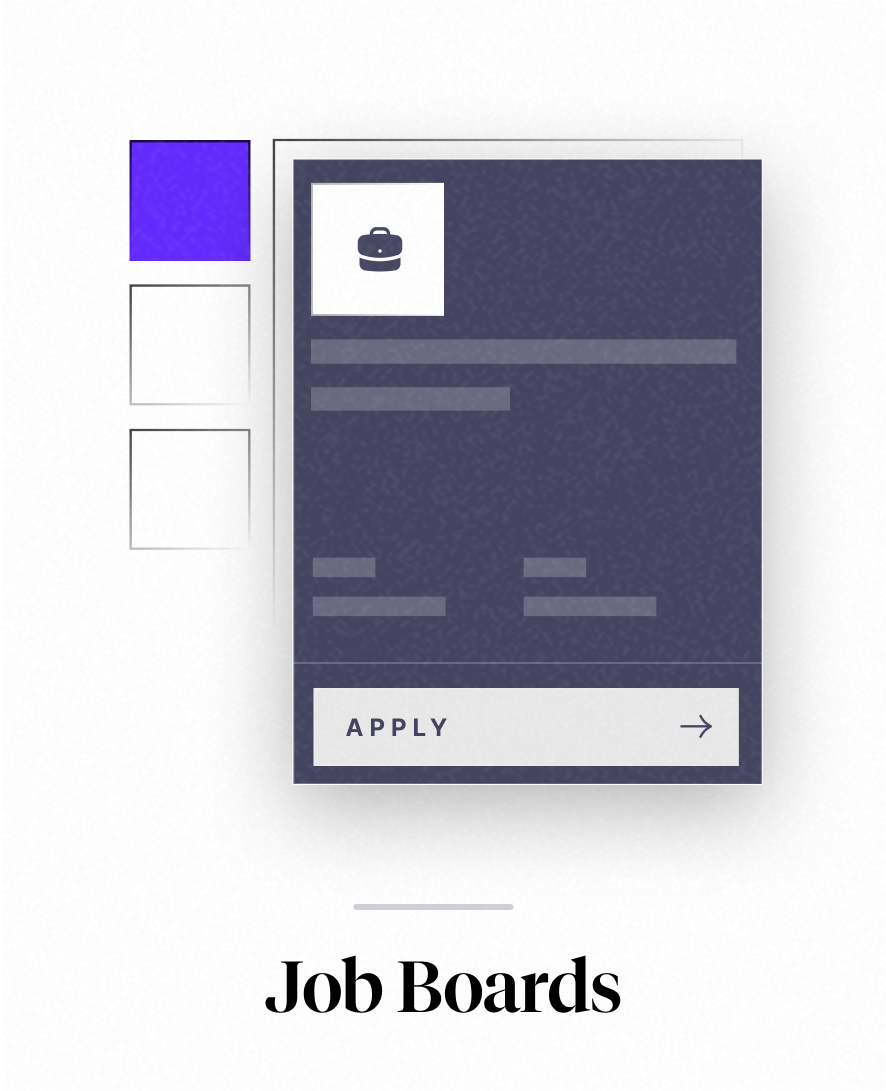Onboarding project | SQLNinja
Hi there, we'll take this one step at a time!
If you struggle with a blank canvas, use this boilerplate to start. Remember, this is a flexible resource—tweak it as needed. Some sections might not apply to your product and you might come up with great ideas not listed here, don't let be restricted.
This is not the only format, we would love to see you scope out a great format for your product!
Go wild and dive deep—we love well-researched documents that cover all bases with depth and understanding.
Product Brief (Continuing from Acquisition project):
SQLNinja is a gamified, AI-assisted SQL learning platform. It understands the user's current competency level and career goals by asking questions in the beginning and creates a tailored path for learners to teach them exactly what they need to learn in order to go to the next level.
Let's create an ideal customer profile:
We also created ICP during the same acquisition project. We will be adding some more nuances to the product features that are used most on the product, what features these ICPs value most, how frequently they use these features, and how much money they are willing to spend on each use case.
Below is the original ICP. At the bottom, there are more nuances related to product usage:
Criteria | Final year college student - looking to get a job in the data analytics field | Analytics professional with 1-2 years of experience | Non-technical professional moving to the data analytics field with 1-2 years of experience |
|---|---|---|---|
Name | Rashi | Sandeep | Rizwan |
Age | 19-24 | 20-26 | 23-30 |
Demographics |
|
|
|
Need | Get a job | Upskill | Transition to data jobs |
Pain Point | Low pocket money, | Go deep in core data skills, Unawareness of analytics career roadmap, | Low pay in the existing jobs, |
Solution | Learn a core data skill to become employable | Learn a core data skill in-depth | Learn a core data skill to transition to data jobs |
Behavior |
|
|
|
Perceived Value of Brand | NA as the product is in early PMF | NA as the product is in early PMF | NA as the product is in early PMF |
Marketing Pitch | Learn the most important data skills - SQL with an AI tutor | Learn advanced SQL and shine at your work with SQL AI tutor | Transition to a data career by learning the most important skills - SQL with an AI tutor |
Goals | Get a decent job in the salary range of 30-100k | Get a promotion | Transition to a data job for a better career prospectus |
Frequency of use case | Daily during job placements | 2-3 times a week (mostly during the weekend) | 2-3 times a week (mostly during the weekend) |
Average Spend on the Product | 1000 INR | 3000 INR | 3000 INR |
More product usage nuances are below:
Most of the features and their benefits have been covered in detail in the acquisition projects so skipping them here to keep it more direct and crisp. Please refer to the acquisition projects if more elaboration on product and market is required.
Criteria | Final year college student - looking to get a job in the data analytics field | Analytics professional with 1-2 years of experience | Non-technical professional moving to the data analytics field with 1-2 years of experience |
|---|---|---|---|
Name | Rashi | Sandeep | Rizwan |
5 Most used features |
|
|
|
2 Most values feature |
|
|
|
Frequency of use | Daily | 2-3 times a week | 2-3 times a week |
Money to spend for use case | While there is not one solution that fits them all. Any product that can help the user build a core skill to get a job can demand up to 5k INR given the need for the product. The use case of the product doesn't fall under wants but a need. | This ICP is more desired-driven. They have a job and want to progress in their career by going deep into one core technical skill. They also know about multiple other competitors and free resources that can help them achieve their goals. They do have the money but would be less willing to pay more than 5k as this is a desirable goal. | This ICP is as clueless as ICP1 - freshers. They need someone to handhold them. They also have the money to pay to upgrade their skills. They can also spend as much as 10k INR if someone is solving their problems in the best way. |
ICP prioritization table:
We do have the below ICP prioritization framework.
Criteria | Freshers | Entry-level data professional | Entry-level non-data professional |
|---|---|---|---|
Adoption Curve | High | High | Medium |
Appetite to Pay | Medium | High | High |
Frequency of Use Case | High | Medium | Medium |
Distribution Potential | High | High | Low |
TAM (Worldwide) | 15 Million | 2.3 Million | 25 Million |
Define user goals and JTBD
(Understand user goals and their JTBD on the platform. When looking at user goals, look at 4 themes, user goals will always be within one of the four)
Objectively what is the user achieving out of your product/service? (use this table to put down your goals and draw JTBD thereon)
In user goals and JTBD, We try to answer three major questions here:
- Who is signing up? - Refer to the previous ICP section for the same.
- What are they trying to do? - We have three core ICPs for this project - Freshers, Entry-level data professionals & Entry-level non-data professionals. We have identified that each of these ICPs has a certain pain point that they want to solve by achieving a certain goal. For instance, A fresher wants to get a job and the rest of 2 ICPs want to get ahead in their career and earn more money.
- Why are the users signing in on your product? - Let's look at this from the eye of each ICP. What are the different goals that they can accomplish using SQLNinja to learn SQL:
JTBD/ICP | Freshers | Entry-level data professional | Entry-level non-data professional |
|---|---|---|---|
Personal | Freshers are eager to acquire new skills that enhance their employability. Learning SQL can empower them with the foundational data skills necessary for various roles in tech and business, helping them grow personally and professionally. | For entry-level data professionals, enhancing their SQL skills is crucial for building a robust career in data analytics or data science. They aim to deepen their knowledge and gain hands-on experience with SQL to excel in their roles and advance in their careers. | Entry-level non-data professionals may see learning SQL as a way to diversify their skill set and enhance their value in the workplace. Gaining a basic understanding of SQL can open up opportunities to collaborate with data teams and contribute to data-driven projects. |
Financial | By mastering SQL, freshers can significantly improve their chances of landing their first job in data-related fields, leading to financial independence through their initial salary. | Proficiency in SQL positions them favorably for promotions and salary increases. They seek competitive compensation that reflects their growing expertise and the high demand for skilled data professionals. | While they may not be in data-specific roles, having SQL skills can make them more competitive in the job market, potentially leading to better job offers and salary packages as they transition into more data-centric positions. |
Social | They seek validation and recognition from peers and potential employers. Freshers want to showcase their newly acquired skills on platforms like LinkedIn, seeking to build connections and demonstrate their commitment to personal growth. | They aim to build a professional reputation within the data community. Networking with other data professionals and sharing their insights or projects can help them gain respect and visibility, leading to career advancement opportunities. | They want to be seen as versatile team members who can contribute to data-driven decisions. Gaining SQL skills allows them to engage in discussions about data and prove their value in a data-centric workplace. |
Functional | Freshers need to learn SQL effectively and efficiently to gain foundational data skills. Their job is to acquire knowledge through engaging tutorials, practice exercises, and assessments that prepare them for entry-level roles. | These professionals need to enhance their SQL skills to perform data analysis and reporting tasks efficiently. Their job involves mastering advanced SQL queries, optimizing database performance, and working with real-world datasets to deliver actionable insights. | Non-data professionals need to understand SQL basics to do their analysis independently and not rely on the data team for simple queries. Their job is to learn how to query databases and interpret results to support their work in cross-functional projects. |
Based on different goals for each ICP, below is the JTBD matrix:
For freshers and Entry-level non-data professionals, the primary goal is to get more money (Financial goal), whereas for Entry-level data professionals, the primary goal is to enhance their skills and deepen their knowledge of SQL.
Goal Priority | Freshers | Entry-level data professional | Entry-level non-data professional |
|---|---|---|---|
Primary | Financial | Personal | Financial |
Secondary | Personal | Financial | Functional |
Tertiary | Social | Social | Social |
Least priority | Functional | Functional | Personal |
Do user research to validate or invalidate these goals
(You want to talk to users and understand why they're signing up. What's the end goal for them and for what job are they "hiring" your product for)
While SQLNinja is still in the pre-PMF phase. We have done some research on the Reddit community to validate some of our hypotheses on primary goals for ICP 1 and ICP 3. Below are some of the examples -
Why did you learn SQL?
on Reddit? Link
here.
(Relevant for freshers from employability POV)
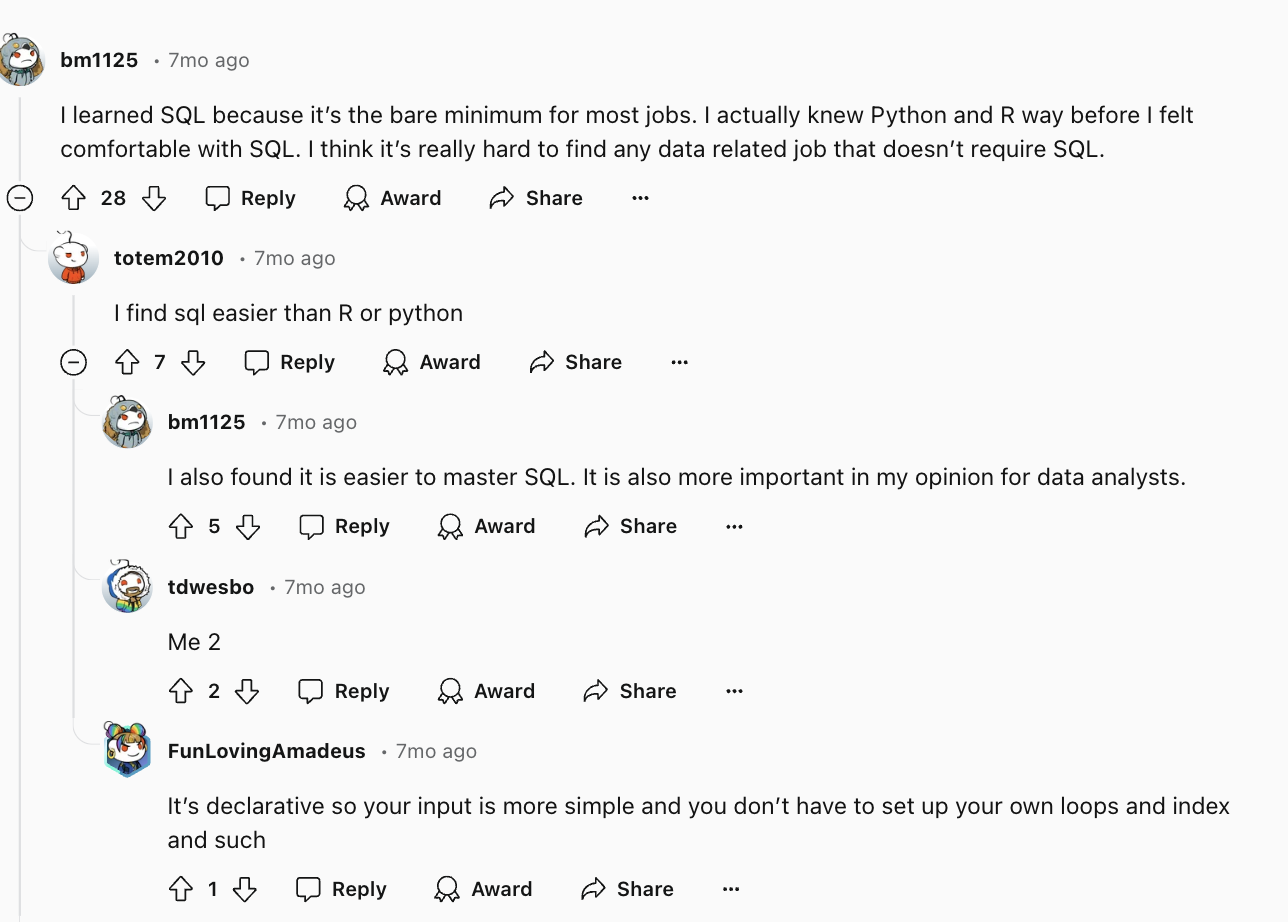
Can you get a job with just SQL? (importance of SQL for freshers and
other professionals to get employable)

Is it still worth to learn SQL?
LinkHow SQL increases hiring potential and help one progress with their career. (importance of learning SQL for fresher to get into data analytics)
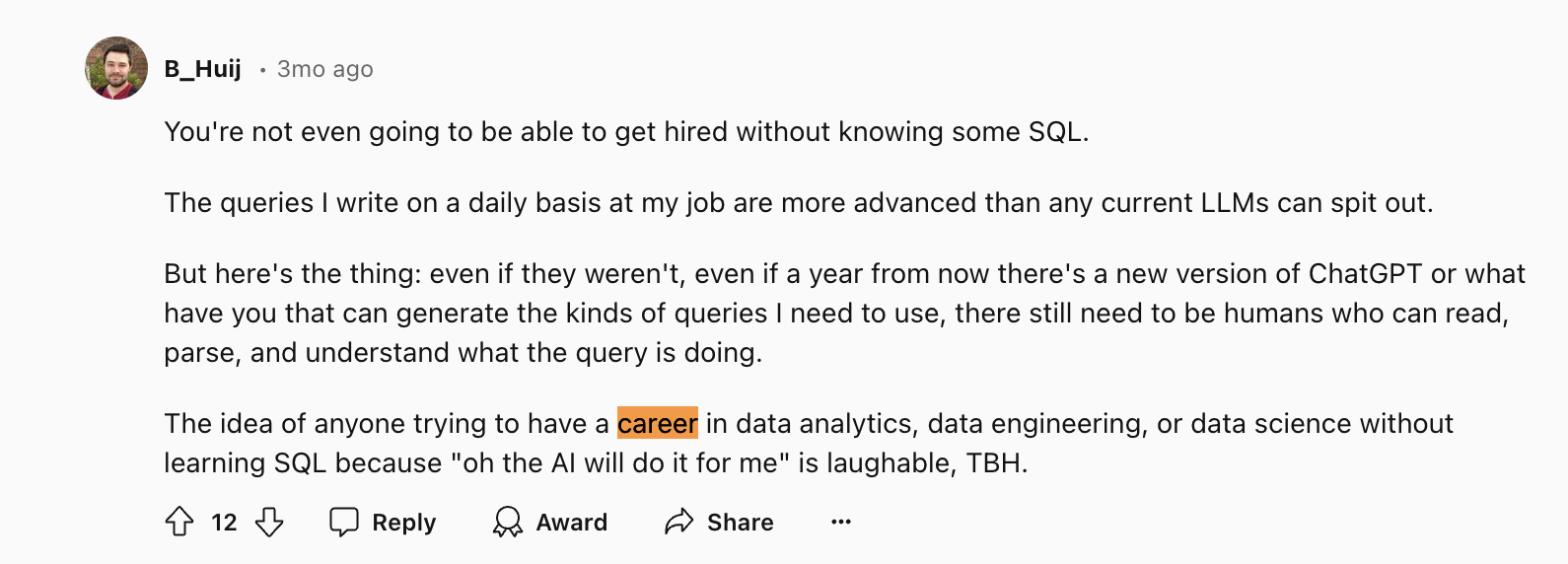
Is SQL worth a career pivot?
Link(This is another validation of why a non-data professional will learn SQL. Such questions have huge upvotes and there are many answers like this.)
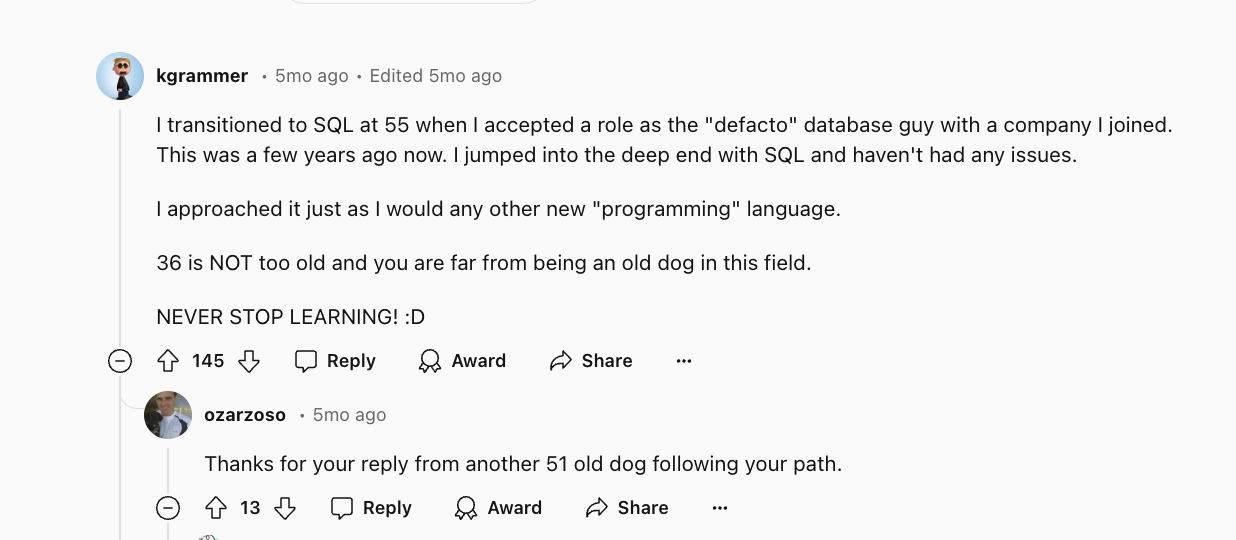
Reddit questions - I want to practice SQL on a Daily basis. Suggest me a book/resource -
Link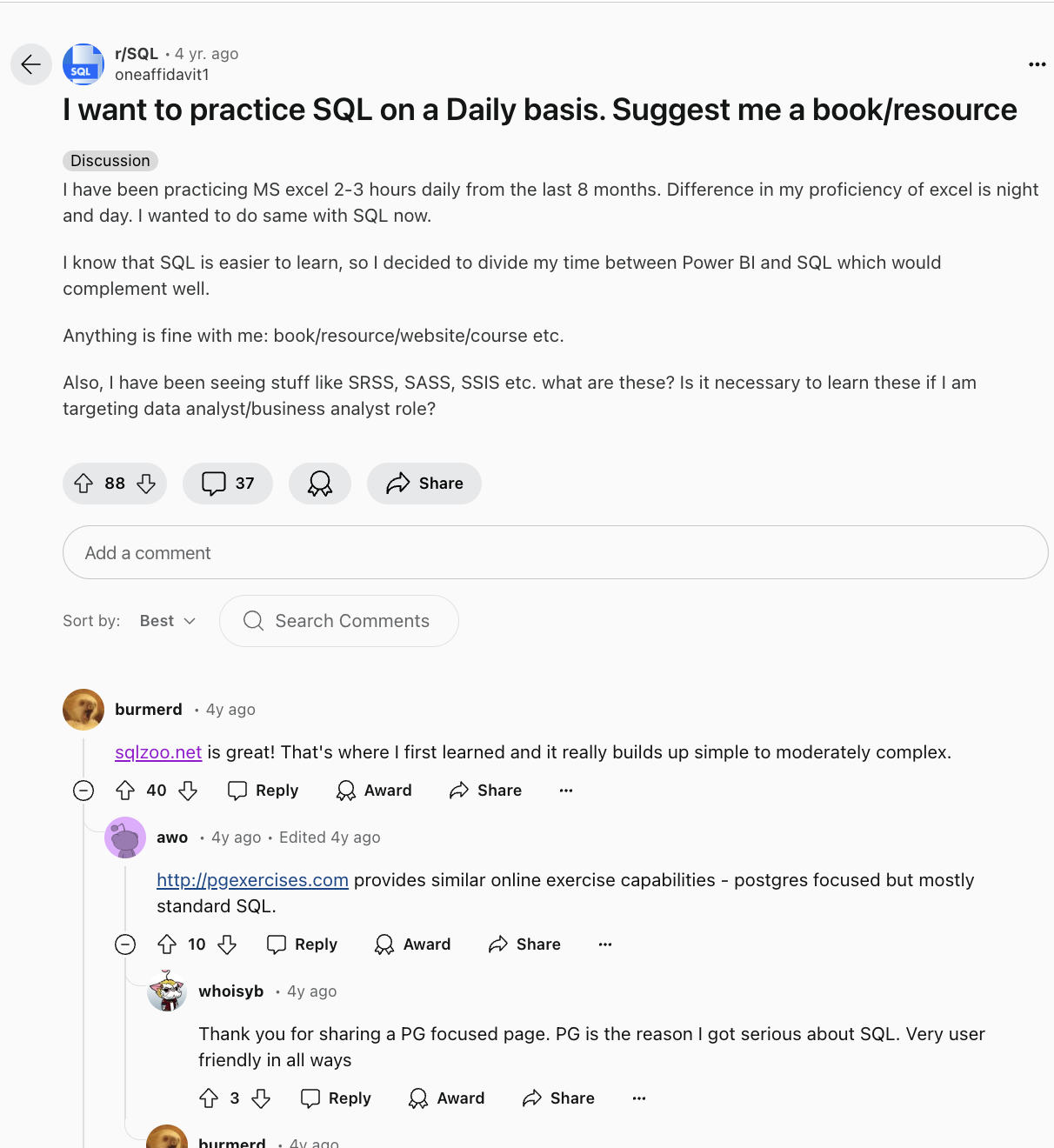
Onboarding Teardown
Step 1 → Start right from your homepage or App listing page
Step 2 → Take screenshots of every single page and interaction throughout the onboarding right till activation.
Step 3 → Start by putting yourself in your customer's shoes. Have empathy for their pain points and then analyze the page/screen.
Link to Onboarding Teardown Slides.
PDF Document - Onboarding Teardown - SQLNinja.pdf
Upon going through the onboarding journey, we have identified that some of the core features of ICP1 and ICP3 were discovered in the journey early such as Daily Challenges and Gamification. However, there were major challenges with personalized learning and how the platform will cater to various learners by providing role-specific challenges. The biggest Aha moment for the user was to see their progress in real time after solving the first daily challenge.
Defining your Activation Metric
Step 1 → Hypothesize at least 5 activation metrics that could be there for your product. (More the better)
1 -
Hypothesis: Solving the SQL query within 1 day of signup is a core activation metric
Reasoning: Solving a query requires the users to go through the question and write an actual SQL query. It requires users to put an effort to successfully solve a query. Upon solving the users receive points and start building a streak, that provides more motivation to the user to solve the problem on the next day.
2-
Hypothesis: Maintaining a streak for 3 days is a core activation metric
Reasoning: Solving queries for 3 days straight suggests that the users are finding the platform well-suitable for their goal and have the motivation to show up every day. Duolingo's streak feature is one of the most important feature for retention and same can work for a similar gamified platform on SQLNinja.
Step 2 → After this, mention in detail all the metrics you'd be tracking and why are you tracking them.
3-
Hypothesis: Progressing and achieving the L2 badge is the core activation metric
Reasoning: There might be some users who might not be able to solve SQL on the daily basis - specially the users who are working professionals. For them, the core activation metric could be attaining the next badge.
Step 2 → After this, mention in detail all the metrics you'd be tracking and why are you tracking them.
Metrics that needed to be tracked:
- % of users who solved their first problem within 1 day post-sign-up: Activation metric for 1st hypothesis
- % of users maintaining a streak for 3 days by sign-up date: Activation metric for 2nd hypothesis
- % of users attaining L2 badge: Activation metric for 3rd hypothesis
- The ratio of homepage to sign-up: To identify opportunities for conversion rate optimization
- The ratio of sign-up to the first query solved: To identify opportunities for conversion rate optimization
- D3, D7, D14, D30, M2, M3 retention: SQL learning requires practice & higher retention across at least 3 months
Brand focused courses
Great brands aren't built on clicks. They're built on trust. Craft narratives that resonate, campaigns that stand out, and brands that last.
All courses
Master every lever of growth — from acquisition to retention, data to events. Pick a course, go deep, and apply it to your business right away.
Explore courses by GrowthX
Built by Leaders From Amazon, CRED, Zepto, Hindustan Unilever, Flipkart, paytm & more
Course
Advanced Growth Strategy
Core principles to distribution, user onboarding, retention & monetisation.
58 modules
21 hours
Course
Go to Market
Learn to implement lean, balanced & all out GTM strategies while getting stakeholder buy-in.
17 modules
1 hour
Course
Brand Led Growth
Design your brand wedge & implement it across every customer touchpoint.
15 modules
2 hours
Course
Event Led Growth
Design an end to end strategy to create events that drive revenue growth.
48 modules
1 hour
Course
Growth Model Design
Learn how to break down your North Star metric into actionable input levers and prioritise them.
9 modules
1 hour
Course
Building Growth Teams
Learn how to design your team blueprint, attract, hire & retain great talent
24 modules
1 hour
Course
Data Led Growth
Learn the science of RCA & experimentation design to drive real revenue impact.
12 modules
2 hours
Course
Email marketing
Learn how to set up email as a channel and build the 0 → 1 strategy for email marketing
12 modules
1 hour
Course
Partnership Led Growth
Design product integrations & channel partnerships to drive revenue impact.
27 modules
1 hour
Course
Tech for Growth
Learn to ship better products with engineering & take informed trade-offs.
14 modules
2 hours
Crack a new job or a promotion with ELEVATE
Designed for mid-senior & leadership roles across growth, product, marketing, strategy & business
Learning Resources
Browse 500+ case studies, articles & resources the learning resources that you won't find on the internet.
Patience—you’re about to be impressed.











